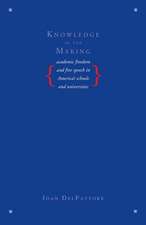Researching Education for Social Justice in Multilingual Settings: Ethnographic Principles in Qualitative Research
Editat de Jean Contehen Limba Engleză Paperback – 13 dec 2017
| Toate formatele și edițiile | Preț | Express |
|---|---|---|
| Paperback (1) | 238.67 lei 3-5 săpt. | |
| Bloomsbury Publishing – 13 dec 2017 | 238.67 lei 3-5 săpt. | |
| Hardback (1) | 774.62 lei 6-8 săpt. | |
| Bloomsbury Publishing – 13 dec 2017 | 774.62 lei 6-8 săpt. |
Preț: 238.67 lei
Preț vechi: 292.72 lei
-18% Nou
Puncte Express: 358
Preț estimativ în valută:
45.68€ • 47.19$ • 38.01£
45.68€ • 47.19$ • 38.01£
Carte disponibilă
Livrare economică 04-18 martie
Preluare comenzi: 021 569.72.76
Specificații
ISBN-13: 9781350002647
ISBN-10: 135000264X
Pagini: 280
Dimensiuni: 156 x 234 x 14 mm
Greutate: 0.41 kg
Editura: Bloomsbury Publishing
Colecția Bloomsbury Academic
Locul publicării:London, United Kingdom
ISBN-10: 135000264X
Pagini: 280
Dimensiuni: 156 x 234 x 14 mm
Greutate: 0.41 kg
Editura: Bloomsbury Publishing
Colecția Bloomsbury Academic
Locul publicării:London, United Kingdom
Caracteristici
Pedagogical features include a glossary of key terms, guiding questions for reading at the start of each section, discussion questions to promote reflection as well as suggestions for further reading
Notă biografică
Jean Conteh is Senior Lecturer in the School of Education at the University of Leeds, UK. She is the author of The EAL Teaching Book (2nd edition, 2015), Teaching Bilingual and EAL Learners in Primary Schools (2012) and Succeeding in Diversity (2003). She also co-edited The Multilingual Turn in Languages Education (2014) and Multilingual Learning Stories in Schools and Communities in Britain (2007).
Cuprins
Foreword, Eve Gregory (Goldsmiths, University of London, UK)Acknowledgements Introduction 1. Principles and Processes of Ethnographic Research in Multilingual Settings, Jean Conteh (University of Leeds, UK) Part I: Conceptualising the Research ProjectIntroduction to Part I , Jean Conteh (University of Leeds, UK) 2. Stories of Becoming Bilingual in Complex Contexts, Yi XiLaMuCuo (Northwest University for Nationalities, China)3. Misrecognition Performances of Multilingual Social Consciousness in the Lives of British-Pakistani Muslim Teachers, Nasir Mahmood (University of Leeds, UK) 4. An Ethnographic Study of Young People from Poor Rural Sindh, Pakistan, Ambreen Shariar (University of Sindh, Pakistan) Part II: Developing the Research Processes Introduction to Part II, Jean Conteh (University of Leeds, UK) 5. Reflecting on My Positionality as a Multilingual Researcher, Chisato Danjo (University of York St. John, UK)6. A Narrative on the Use of Interviews to Shape an Ethnographic Research into Family Language Practices, Indu Meddegama (University of York St. John, UK) 7. Making Young People's Voices Audible in Ethnographic Research, Robert Sharples (University of York St. John, UK) 8. Liquid Methodologies in Researching Multilingual Street Performance, Jessica Bradley (University of Leeds, UK) Part III: Reflections on Processes and Outcomes Introduction to Part III, Jean Conteh (University of Leeds, UK) 9. Exploring the Influences of Social Background and Parental Concern on Pupils' Participation in Ability Based Groups, Samyia Ambreen (University of Leeds, UK)10. Insider and Outsider Perspectives on the Researcher's Role, Valerie Nave (University of Leeds, UK)11. Participant Observations in Community Language Schools in Australia, Janica Nordstrom (University of Sydney, Australia) 12. Striving for Participation in a Case Study of Bilingual Children's Experiences of Language and Identity in State Primary Schools in Cyprus, Katherine Fincham-Louis (University of Nicosia, Cyprus) 13. Drawing the Threads Together and Telling the Stories, Jean Conteh (University of Leeds, UK) Glossary Index
Recenzii
One of the key qualities of this publication is its honesty and transparency: it enables a critical look behind the scenes of academic enquiry, which is so often shielded from view in finished and published projects ... An informative and encouraging read not only for students, but for anyone interested in engaging with practical matters in the research process.
This is a highly engaging book, a rich source of case studies in ethnography but with a particular focus on language and social justice, giving voice to researchers in a range of contexts around the world. It is an excellent resource for anyone interested in ethnography and particularly useful for doctoral students.
This collection of reflective case studies of multilingual research in action provides readers with valuable insights and hands-on guidance in developing research projects from the bottom up.
Importantly it discusses key research in the context of research studies which benefit from the standpoint of doctoral students and early career researchers. It will be invaluable for student teachers and help to bring the credibility to ethnographic work.
This is a highly engaging book, a rich source of case studies in ethnography but with a particular focus on language and social justice, giving voice to researchers in a range of contexts around the world. It is an excellent resource for anyone interested in ethnography and particularly useful for doctoral students.
This collection of reflective case studies of multilingual research in action provides readers with valuable insights and hands-on guidance in developing research projects from the bottom up.
Importantly it discusses key research in the context of research studies which benefit from the standpoint of doctoral students and early career researchers. It will be invaluable for student teachers and help to bring the credibility to ethnographic work.















